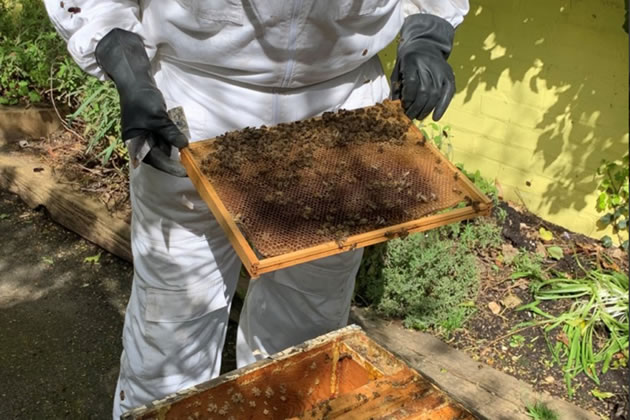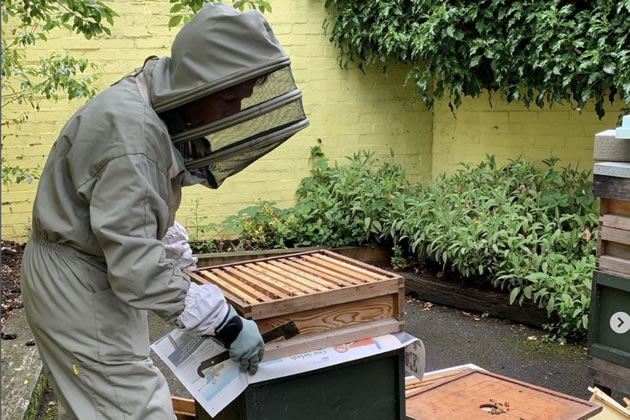Battersea Bees Thrive At The Children's Zoo
As apiary manager successfully adds a small swarm colony

One of the honey bee hives. Picture: Battersea Park Children's Zoo
Earlier this Spring Battersea Park’s Children’s Zoo announced the opening of its educational apiary, in partnership with the London Beekeepers’ Association.
A whole new area is now home to western honey bee hives which are maintained by a dedicated team from the Beekeepers Association. And this month the Zoo’s apiary manager undertook a particularly important maintenance task when she mixed a small swarm colony, which didn’t have a queen, with one of the Zoo’s established colonies, complete with its queen.
Apiary manager Annie started by slowly placing the new bees into the top section of the Zoo’s hive. She carefully positioned a newspaper between the old colony and the new bees to ensure the bees slowly chew through the paper over a period of a few days, and their odours gradually mix to the point where both sets of bees are unable to distinguish between each other and the two colonies combine.
To prevent bee fights, it is vital to have a slow introduction when mixing bees from different colonies into one hive.

Apiary manager Anne introduces a new bee colony. Picture: Battersea Park Children’s Zoo Instagram
Jamie Baker, Animal Manager at the Children’s Zoo, embarked on the honey bee project with the aim of inspiring the next generation to take an interest in pollinating insects. Jamie invited members of the London Beekeepers Association to the Zoo for discussions on the educational benefits of sustainable beekeeping.
Tristram Sutton, Apiaries Manager at the London Beekeepers Association, said the teaching apiary, “Hopes to provide an example of more sustainable beekeeping by increasing awareness of the role of pollinators in the urban ecosystem and, by sharing the actual beekeeping between a group of volunteers from the LBKA, providing access to beekeeping for more beekeepers per hive.”
London is a challenging environment for many beneficial insects, the Children’s Zoo points out. With the increase in building developments reducing the opportunity for the planting of large flowering trees, the number of managed honey bee colonies in the capital has doubled in recent years. “As well as this, budget cuts have led to more low-maintenance and non-flowering planting in many public open spaces, flora that doesn’t encourage native pollinators. Fewer resources for our pollinators have led to increasing competition between insects for diminishing food sources – something that is particularly damaging to wild populations of social and solitary bees, hoverflies, butterflies, moths, wasps and beetles.”
Maintenance of the Children’s Zoo hives takes place weekly, and the beehives can be found at the back of the zoo, near the Scottish wildcats.
The London Beekeepers' Association is a volunteer-run charity that represents the interests of beekeepers and urban beekeeping in the central London area. It provides education and advice, promoting responsible bee keeping and raising awareness of the issues affecting bees.
Like Reading Articles Like This? Help Us Produce More This site remains committed to providing local community news and public interest journalism. Articles such as the one above are integral to what we do. We aim to feature as much as possible on local societies, charities based in the area, fundraising efforts by residents, community-based initiatives and even helping people find missing pets. We've always done that and won't be changing, in fact we'd like to do more. However, the readership that these stories generates is often below that needed to cover the cost of producing them. Our financial resources are limited and the local media environment is intensely competitive so there is a constraint on what we can do. We are therefore asking our readers to consider offering financial support to these efforts. Any money given will help support community and public interest news and the expansion of our coverage in this area. A suggested monthly payment is £8 but we would be grateful for any amount for instance if you think this site offers the equivalent value of a subscription to a daily printed newspaper you may wish to consider £20 per month. If neither of these amounts is suitable for you then contact info@neighbournet.com and we can set up an alternative. All payments are made through a secure web site. One-off donations are also appreciated. Choose The Amount You Wish To Contribute. If you do support us in this way we'd be interested to hear what kind of articles you would like to see more of on the site – send your suggestions to the editor. For businesses we offer the chance to be a corporate sponsor of community content on the site. For £30 plus VAT per month you will be the designated sponsor of at least one article a month with your logo appearing if supplied. If there is a specific community group or initiative you'd like to support we can make sure your sponsorship is featured on related content for a one off payment of £50 plus VAT. All payments are made through a secure web site. |